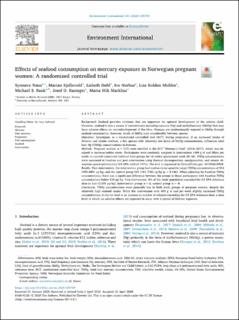| dc.contributor.author | Næss, Synnøve | |
| dc.contributor.author | Kjellevold, Marian | |
| dc.contributor.author | Dahl, Lisbeth Jane | |
| dc.contributor.author | Nerhus, Ive | |
| dc.contributor.author | Midtbø, Lisa Kolden | |
| dc.contributor.author | Bank, Michael | |
| dc.contributor.author | Rasinger, Josef Daniel | |
| dc.contributor.author | Markhus, Maria Wik | |
| dc.date.accessioned | 2020-10-27T12:53:31Z | |
| dc.date.available | 2020-10-27T12:53:31Z | |
| dc.date.created | 2020-05-07T10:43:56Z | |
| dc.date.issued | 2020 | |
| dc.identifier.issn | 0160-4120 | |
| dc.identifier.uri | https://hdl.handle.net/11250/2685281 | |
| dc.description.abstract | Seafood provides nutrients that are important for optimal development of the unborn child. However, seafood is also a source of contaminants including mercury (Hg) and methylmercury (MeHg) that may have adverse effects on neurodevelopment of the fetus. Humans are predominantly exposed to MeHg through seafood consumption, however, levels of MeHg vary considerably between species. | en_US |
| dc.language.iso | eng | en_US |
| dc.title | Effects of seafood consumption on mercury exposure in Norwegian pregnant women: a randomized controlled trial | en_US |
| dc.type | Peer reviewed | en_US |
| dc.type | Journal article | en_US |
| dc.description.version | publishedVersion | en_US |
| dc.source.journal | Environment International | en_US |
| dc.identifier.doi | 10.1016/j.envint.2020.105759 | |
| dc.identifier.cristin | 1809750 | |
| cristin.ispublished | true | |
| cristin.fulltext | original | |
| cristin.qualitycode | 1 | |
